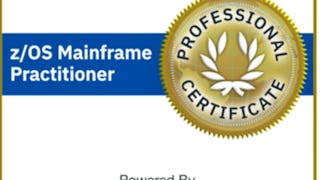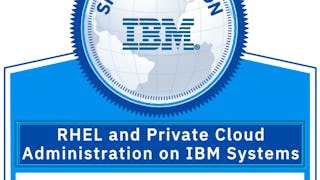Filter by
SubjectRequired
LanguageRequired
The language used throughout the course, in both instruction and assessments.
Learning ProductRequired
LevelRequired
DurationRequired
SkillsRequired
SubtitlesRequired
EducatorRequired
Explore the UNIX Course Catalog
 Status: New
Status: NewSkills you'll gain: Data Warehousing, SQL, Extract, Transform, Load, Apache Airflow, Web Scraping, Linux Commands, Database Design, Database Administration, MySQL, Data Pipelines, Apache Kafka, Database Management, Bash (Scripting Language), Shell Script, Database Architecture and Administration, Data Transformation, Data Store, IBM DB2, Jupyter, Generative AI

Akamai Technologies, Inc.
Skills you'll gain: SQL, Linux, Endpoint Security, Database Management, Incident Response, Relational Databases, Network Security, Database Systems, Vulnerability Scanning, Linux Administration, File Systems, Routing Protocols, OSI Models, Application Development, Remote Access Systems, Linux Commands, TCP/IP, Scripting, MySQL, Data Structures

Skills you'll gain: Job Control Language (JCL), Mainframe Computing, z/OS, Virtualization, Virtualization and Virtual Machines, Unix, IBM DB2, Operating Systems, IBM Cloud, Data Management, Hardware Architecture, Data Storage, Infrastructure Architecture, System Programming, File Systems, Enterprise Security, Computer Security, System Configuration, Control Panels, Command-Line Interface

LearnQuest
Skills you'll gain: Package and Software Management, Linux Administration, Linux, Linux Commands, Linux Servers, Virtual Private Networks (VPN), System Monitoring, Public Key Infrastructure, File Management, Command-Line Interface, Intrusion Detection and Prevention, Git (Version Control System), File Systems, User Accounts, Firewall, Remote Access Systems, Cloud Computing Architecture, Unix Commands, DevOps, Virtualization

Skills you'll gain: Software Development Life Cycle, Linux Commands, Unit Testing, Bash (Scripting Language), Shell Script, Git (Version Control System), GitHub, Development Environment, Version Control, File Management, Jupyter, Software Engineering, Software Development Tools, Application Deployment, Collaborative Software, Automation, Flask (Web Framework), Web Scraping, Python Programming, Software Testing

Skills you'll gain: Private Cloud, Red Hat Enterprise Linux, Linux Administration, Linux, Package and Software Management, Linux Servers, Linux Commands, Command-Line Interface, IBM Cloud, User Accounts, Cloud Management, Virtual Machines, Infrastructure As A Service (IaaS), Open Source Technology, File Management, Unix Commands, Systems Administration, Cloud Infrastructure, Virtualization, Cloud Computing

Skills you'll gain: Data Warehousing, SQL, Extract, Transform, Load, Apache Airflow, Linux Commands, IBM Cognos Analytics, Data Pipelines, Apache Kafka, Bash (Scripting Language), Shell Script, Dashboard, File Management, Star Schema, Unix Shell, IBM DB2, Business Intelligence, Interactive Data Visualization, Databases, Stored Procedure, Relational Databases
 Status: New
Status: NewSkills you'll gain: NoSQL, Data Warehousing, SQL, Apache Hadoop, Extract, Transform, Load, Apache Airflow, Data Security, Linux Commands, Data Migration, Database Design, Data Governance, MySQL, Apache Spark, Data Pipelines, Apache Kafka, Database Management, Bash (Scripting Language), Shell Script, Database Architecture and Administration, Data Store

University of Michigan
Skills you'll gain: C (Programming Language), C++ (Programming Language), Object Oriented Programming (OOP), Data Structures, Programming Principles, Algorithms, Computer Programming, Software Design, Application Security, Other Programming Languages, Python Programming, System Programming, Java, Performance Tuning, Numerical Analysis, Unix, Computer Science, Debugging

The Linux Foundation
Skills you'll gain: Package and Software Management, Open Source Technology, Git (Version Control System), Linux, Command-Line Interface, Bash (Scripting Language), File Systems, GitHub, Linux Administration, Version Control, Linux Commands, User Accounts, CI/CD, Unix Commands, Shell Script, System Configuration, Collaborative Software, Unix Shell, Software Development Tools, Software Versioning

Skills you'll gain: Data Warehousing, SQL, Extract, Transform, Load, Apache Airflow, Linux Commands, Database Design, IBM Cognos Analytics, MySQL, Data Pipelines, Apache Kafka, Database Management, Bash (Scripting Language), Shell Script, Database Architecture and Administration, Data Store, IBM DB2, Relational Databases, Dashboard, File Management, Star Schema
 Status: New
Status: NewSkills you'll gain: Shell Script, Unix Shell, File Management, User Accounts, Unix, Package and Software Management, Systems Administration, File Systems, TCP/IP, Unix Commands, System Monitoring, Disaster Recovery, System Software, System Configuration, Operating Systems, OS Process Management, Command-Line Interface, Debugging, System Support, Network Administration
Unix learners also search
In summary, here are 10 of our most popular unix courses
- IBM Relational Database Administrator: IBM
- Akamai Network Engineering: Akamai Technologies, Inc.
- IBM z/OS Mainframe Practitioner: IBM
- Learning Linux for LFCA Certification: LearnQuest
- Applied Software Engineering Fundamentals: IBM
- Linux and Private Cloud Administration on IBM Power Systems: Red Hat
- BI Foundations with SQL, ETL and Data Warehousing: IBM
- IBM Data Architecture: IBM
- C Programming for Everybody: University of Michigan
- Open Source Software Development, Linux and Git: The Linux Foundation










